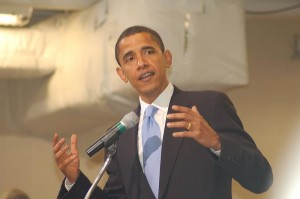 In some alternate universe, President Obama follows up on his reform of healthcare and financial regulations by pivoting to an overhaul of public education in the United States. Instead of spending 2011 on the predictable, partisan ground of raising upper income taxes while growth is weak, Obama might have spent the year making a case that a vibrant economy demands a skilled, advanced workforce and that our outdated method of educating our children is inadequate to the challenge.
In some alternate universe, President Obama follows up on his reform of healthcare and financial regulations by pivoting to an overhaul of public education in the United States. Instead of spending 2011 on the predictable, partisan ground of raising upper income taxes while growth is weak, Obama might have spent the year making a case that a vibrant economy demands a skilled, advanced workforce and that our outdated method of educating our children is inadequate to the challenge.
Alas, that is not the reality we live in. Obama’s signature plan of incentivizing states to embrace their own reforms, The Race to The Top, is being nibbled to irrelevance; rather than spending political capital to revamp No Child Left Behind, the administration is following the easy course of killing it softly with waivers; charter schools have gone two straight State of the Union addresses without being mentioned; and if the president believes that the stratification in the quality of our schools from one zip code to another is a major contributor to income inequality, he has scarcely said so.
 Had Obama adopted education reform as an agenda item, he would have profited from the Republican inertia on the subject. Whether it was Rick Perry on the days he remembered his pledge to abolish the Department of Education, or Newt Gingrich promising to downsize the department to a clipping service for inventorying data, or Mitt Romney trotting out old rhetoric about “local control”, the GOP presidential field has been one long yawn on the notion of education as a public priority.
Had Obama adopted education reform as an agenda item, he would have profited from the Republican inertia on the subject. Whether it was Rick Perry on the days he remembered his pledge to abolish the Department of Education, or Newt Gingrich promising to downsize the department to a clipping service for inventorying data, or Mitt Romney trotting out old rhetoric about “local control”, the GOP presidential field has been one long yawn on the notion of education as a public priority.
It’s a bipartisan omission that signifies the power of each party’s political base. For Obama, bold action on educational accountability seems to be a casualty of a post debt-ceiling reelection strategy that is base reinforcement all the time. On the right, denigrating the public sector is easier work than laying out a foundation to make its elements, including education, more productive.
The blunt truth is that it is no longer tenable to make teaching the one profession where weak performance is no grounds for termination. It is not sustainable that teaching is the sole creative profession where it is suspect to reward performance with bonuses. It makes no sense that a 50 year old chemist or executive has no pathway to enter the classroom to teach science or civics. It is indefensible that a 25 year old Ivy League science grad who wants to teach for two years has a harder time getting a teaching certificate than a C level education major from a college struggling to keep its accreditation. It’s impossible to explain why establishing a leadership track to train young professionals to be principals, modeled after officer candidate school in the military, is third rail material in education politics.
As Republicans rethink how to beat Obama in an environment where consumer confidence is rising, and a case is building for his economic stewardship, they would do well to sound off on these hard truths, and to link them to an indictment of how the Democratic Party’s entanglement with its political clients destroys innovation. This, by the way, is another reason so many conservatives and reform minded independents still pine for Mitch Daniels, or Jeb Bush, or Chris Christie. They’ve all built governing legacies around revitalizing education, and reminding divided electorates why liberalism struggles so much to solve the future.
(Cross-posted, with permission of the author, from Politico’s Arena)









Leave a Reply